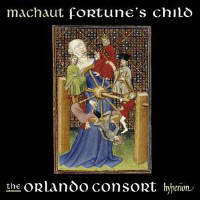Texte paru dans: / Appeared in: |
|
|
Outil de traduction ~ (Très approximatif) |
|
|
Reviewer: J.
F. Weber
Going beyond Le Roman de
Fauvel, O Fortuna, velut luna of the Carmina burana, and Machaut’s own Le
Remède de Fortune, this collection, titled Fortune’s Child, pursues the
whims of Fortune’s wheel in 14 of the composer’s ballades, virelais, motets,
and rondeaus. This may be one of the more appealing programs of the Orlando
Consort’s ongoing traversal of the music of Guillaume de Machaut (c.
1300–1377), for it is made up of familiar but not overly duplicated pieces
on disc. There are no first recordings, though there are some that have not
been recorded satisfactorily. This is the first recording without
instruments of Dame, mon cuer; Dame, vostre dous viaire; Gais et jolie; Puis
que ma dolour, and Riches d’amour. Only a few selections on this disc are
available in satisfactory versions, including Comment puet in the group’s
1997 Archiv collection (22:5), an excellent Dame, je vueil in a Gothic
Voices program (17:1), and a fine Douce dame, tant com vivray in another
Gothic Voices disc (30:4); Hé! Mors and Trop plus est belle are in the
Hilliard Ensemble set of motets (27:5), while Helas! pour quoy virent and
Trop plus est belle are unaccompanied in the Ensemble Musica Nova set (28:1
and 35:2). As in every disc in this series, the songs are recorded complete,
not so unusual recently but formerly uncommon. While the series was first
announced as the composer’s complete polyphonic songs, every disc after the
first includes solo virelais, four in this case, assigned to three of the
four singers. (The solo lais, represented only by one in the first disc, may
not be part of the plan.) As announced in the first issue, the music is sung from the new Complete Poetry and Music of Guillaume de Machaut, with the second volume just announced from the University of Michigan Press. The unique aspect of this publication is the union of scholars, including Yolanda Plumley and others, from the fields of music, poetry, and art illumination working together on Machaut’s creativity. I found the four solo virelais the most gratifying part of the program. As in every Orlando Consort recording, we hear no instruments added to the voices, as Christopher Page advocated as far back as 1977. | |
|
|
|
|
|
|
|
Cliquez l'un ou l'autre
bouton pour découvrir bien d'autres critiques de CD |
|




